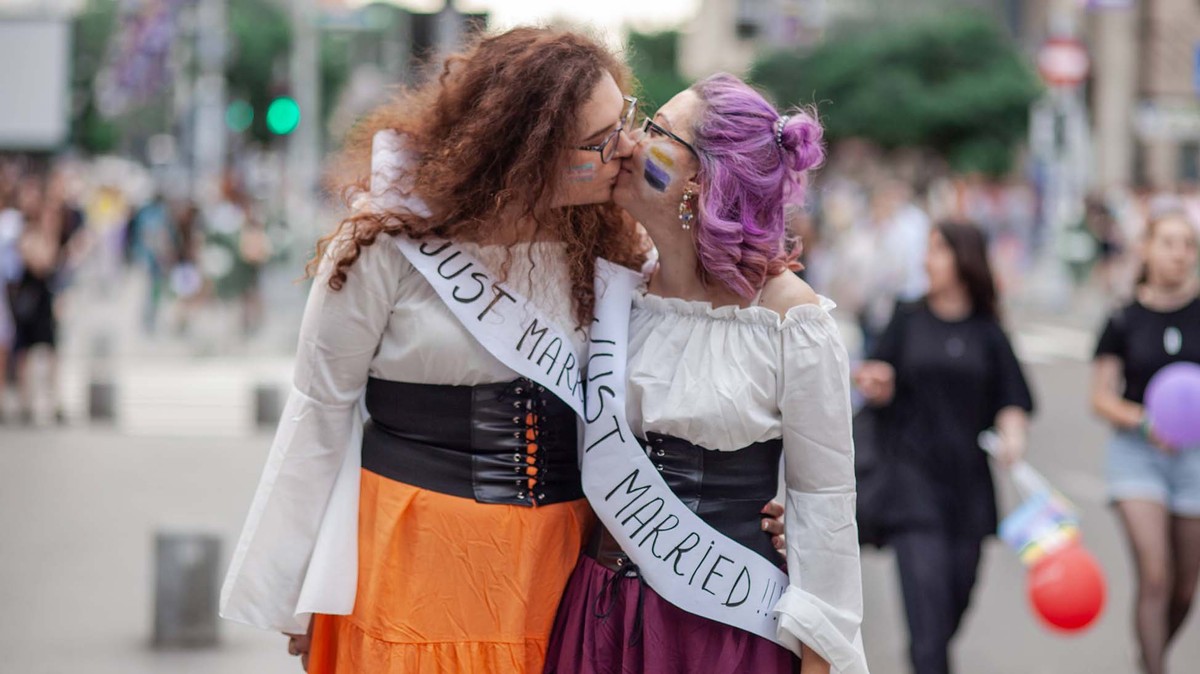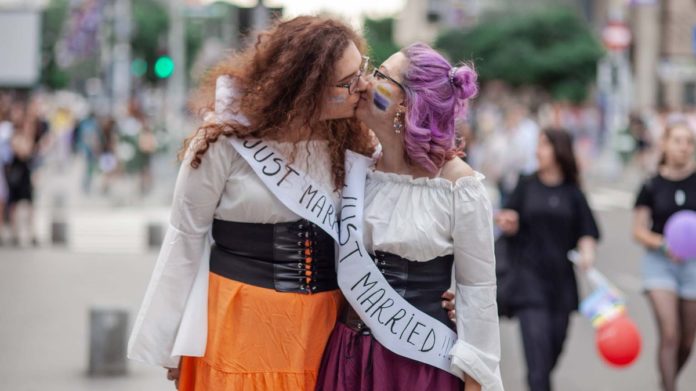
This article originally appeared on VICE Romania.
On a Saturday in early July, I arrived at the Bucharest town hall to attend a very special event – my old friend Georgiana was getting married to her partner Evie. What makes this particular union so noteworthy is that the two women, who asked not to share their full names for privacy and safety reasons, are getting married in Romania, a country that has banned gay marriage and has some of the most discriminatory laws and attitudes towards LGBTQ people in Europe.
So how did they do it? Well, Evie is a trans woman and hasn’t yet changed her gender on her documents. This allowed the couple to circumvent their country’s restrictive definition of marriage – at least, on paper.
Georgiana and Evie met on Tinder in October 2021 and, true to lesbian relationship stereotype, moved in with each other a month later. Georgiana proposed in December, and Evie did the same in April (double proposing is one of the ways the LGBTQ people are rethinking the wedding industry).
“We decided to rush the marriage because Evie is going to change her gender on her ID. After that, we won’t be able to do it anymore,” Georgiana explained when I caught up with the brides-to-be a week before the big day. Both of them have been previously married: Georgiana got divorced in 2016, and Evie, who had a child with her previous partner, got divorced in 2021 after she came out as trans.
Evie was 36 then, and her coming out put an end to a long bout of trouble with her metal health. “In the trans community, they call it mental gymnastics,” she said. “Instead of accepting you are trans – because that would cause you countless problems – you start finding all kinds of other reasons for your depression.”
Even though it took her a while to get there, Evie said transitioning as an adult rather than as a child or teenager has its perks. “You don’t care so much about other people’s opinions, you don’t get bullied in school and you don’t depend on your parents anymore,” she explained. “You have your own money, your own place, and you’re not afraid that your parents will kick you out.”
That was a very real fear for Evie, especially since her mum still doesn’t accept her. “She said she felt like she lost a child, that it was replaced by a stranger,” Evie recalled. Unfortunately, her best friend ended up distancing himself from her, too. But the joy of transitioning proved greater than the pain of losing people, and “I made new friends, anyway,” Evie smiled. Besides, some people in her life have always been supportive, including her ex-wife and child, who now calls her “mummy” when she visits her and Georgiana.
Georgiana and Evie chose to get married on the 9th of July, hours before the Bucharest Pride march. Inside the town hall, I felt an uncomfortable lump in my throat when I saw all the straight couples waiting to be married in front of their families – what can I say? I’m not so much into weddings. I only chilled out once I saw the merry couple arrive with Georgiana’s mother and a few friends – Georgiana in an elegant suit and heels, Evie in a colourful summer dress and sneakers.
Unfortunately, Georgiana’s father didn’t attend. “He told me he’s from a different time and he doesn’t understand,” she said. Evie’s parents weren’t present either. “When I told my mom I was going to marry Georgiana, her face changed and she started crying,” she said. “I told her that if she couldn’t be happy for us, she shouldn’t come to our wedding.” But Evie is hopeful her mother might change her mind before next year, when the couple plans on having a celebration with friends and family.
After some hugs and a few encouraging jokes, our group was called to the town hall’s gate and asked for the “bride and groom’s” documents. “They’re probably going to dead name me, I don’t expect anything else from them, honestly,” Evie said. “I think the civil servants will do their best to show that they do not agree with the situation. But at the end of the day, they’ll have to do their jobs.”
Evie and Georgiana came prepared – in the days leading up to the wedding, they researched laws about discrimination based on gender, sexual orientation and appearance to avoid any potential problems. They showed up to their big day like it was court, armed with printouts of all the applicable rules and regulations.
Romanian law says it’s illegal to deny someone a public service on the grounds of race, nationality, ethnicity, religion, social category, age, gender or sexual orientation. It also states that it’d be illegal to refuse to marry someone because of how they choose to present themselves.
Despite what the law says, the couple were still prevented from entering the courtyard of the town hall by the person who took their documents, who said someone would come talk to them. Five minutes later, a middle-aged lady in a Romanian flag sash came down the stairs and asked who the groom was.
“Me,” Evie replied without blinking. “Sir, we have a problem. I can’t marry you unless you go home and dress nicely as a man,” the public servant said.
“Excuse me, but why don’t you tell me to go home and dress nicely like a woman?” Georgiana added, poignantly.
“Quiet, I’m not talking to you, I’m talking to the gentleman here!” the woman said. (Guess transphobia really does go hand in hand with misogyny.)
While the women were showing the public servant proof of their rights to get married, the latter kept insisting that Evie had to go home and put on some trousers. “Where does it say in the law how one must be dressed at the civil registry?” Georgiana asked.
“We live in Romania,” the town hall representative said, “and there are no men in dresses here!” Finally, the woman told us to wait while she called her superior. She talked on the phone for a few very long minutes, during which the guards at the municipality’s gate made it plain we were not allowed to take a step past that gate.
Eventually, she came back to us, only to refuse Evie and Georgiana the service once again. Meanwhile, a crowd had gathered around us and were watching, some laughing, others filming the unfolding scene on their phones.
Starting to doubt whether we’d make it through, I found myself addressing the lady all teary-eyed. “Madam, do you really want to ruin this day for two people who love each other just because of the clothes they’re wearing?” I asked.
In the end, I don’t know what worked, the civil servant’s empathy or the law. She made another long phone call, came back and let us into the building, but told us we couldn’t take pictures. “Why? It’s as much of a special moment for us as it is for everyone who gets married!” asked Georgiana. The town hall rep must have gotten tired of arguing, because she just waved a hand and agreed.
Once inside, she started reading from the civil marriage script, emphasising very bluntly that “marriage is the union between a man and a woman”, even though the original text doesn’t actually say that. She did, however, end the speech with, “Congratulations and I apologise for the inconvenience. What can I say, I never witnessed something like this in my whole life.”
“Times change, lady,” someone in our group replied. “You’ll see a lot more of this in the future!”
The celebrations continued at an LGBTQIA+-friendly restaurant, where we toasted with a glass of bubbly before we all headed to Bucharest Pride to celebrate.
This huge moment behind us, both the newlyweds and the LGBTQIA+ community in Romania are waiting to see what the official response will be once Evie legally changes her gender. But whatever happens, this was an important precedent for our country, and I hope it’ll give hope to young queer people who live in fear of being themselves in a hostile society. Like I said, weddings don’t usually do much for me – but this time, I found myself in tears.
“Why are you crying?” Georgiana asked. I wiped my nose and smiled back through my tears: “Because this is the world I’d like to live in.”








